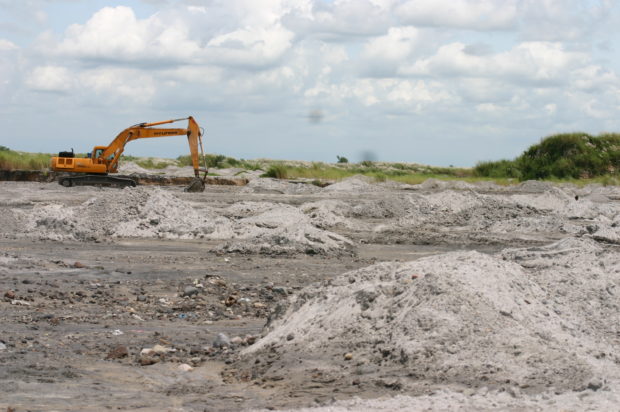Pampanga taps P1-billion quarry revenue to support COVID-19 response

INCOME SOURCE The quarrying of Mt. Pinatubo’s sand for the construction industry brings revenues to Pampanga, one of the provinces in Central Luzon devastated by the volcano’s eruption in 1991. —TONETTE OREJAS
CITY OF SAN FERNANDO, Pampanga, Philippines — The Pampanga provincial government has earned P1.036 billion from Mt. Pinatubo’s sand and gravel in the past 19 months, providing an additional local income that will help officials deal with the pandemic.
In a statement, Gov. Dennis Pineda on Tuesday said the quarry revenue last month alone reached P72.8 million, citing data from the provincial quarry monitoring unit Kalam.
The total collection is the highest so far since 1991 when Mt. Pinatubo erupted, making the commercial mining of sand and other volcanic sediments viable.
Kalam reported no earnings from March 20 to May 17 last year because of the strict community quarantine.
According to Kalam records, the July 2019 to February 2021 collection was based on P150 sand tax, P250 administrative fee, P30 weighing scale fee, sand and gravel permit, and motor vehicle and heavy equipment accreditation, including fines and penalties.A provision in the Local Government Code of 1991 (Republic Act No. 7160) sets the sharing of the sand tax at 40-30-30 percent among the villages, towns or cities and the province, respectively.
Article continues after this advertisementTransparent inventory
Pineda said booklets of quarry receipts were inventoried and recorded for transparency.“The amount we collected proved that the monitoring and collecting system we put in place is efficient,” Pineda said.
Article continues after this advertisementHe said the strong quarry revenue collection also showed that operators and haulers had been complying with the local government’s policies.
Pineda said the provincial government used part of the quarry proceeds to set up three COVID-19 quarantines in the province and to assist returning Pampanga residents amid the pandemic.
He said they also established swabbing centers and isolation areas through the quarry revenues.
The Porac Sand and Gravel Quarry Operators Association Inc. donated two ambulances, worth P3 million each, in support of the provincial health-care program, according to the group’s president, Antonio Ayson.